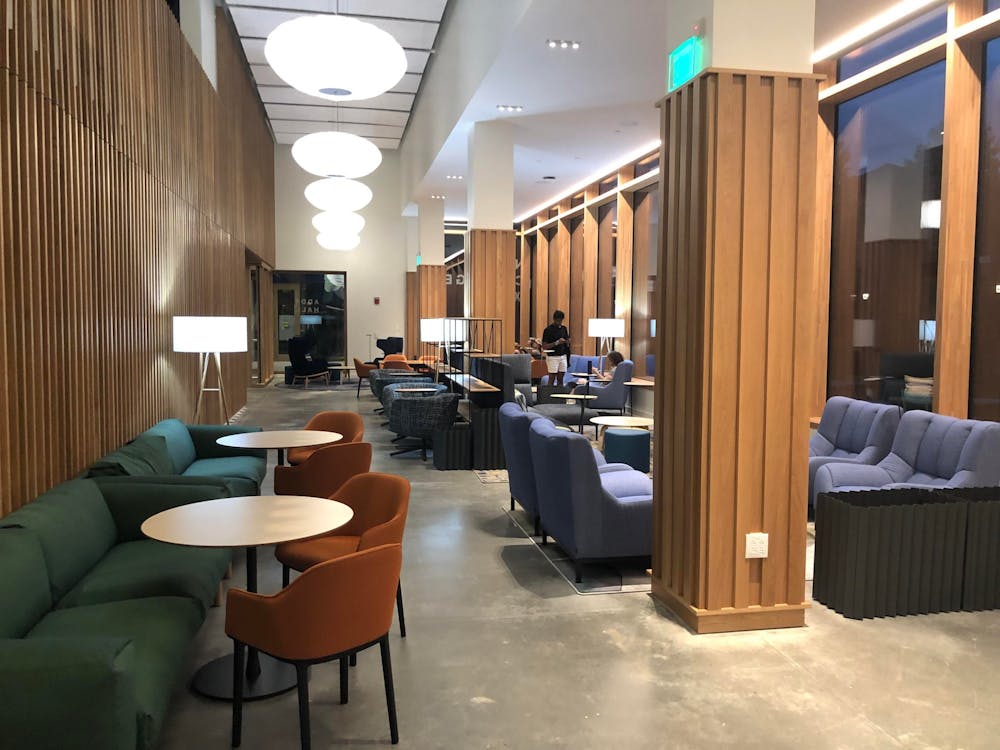New undergraduatecertificates in Cognitive Science,Ethnographic Studies, and History and the Practice of Diplomacy will be available beginningJuly 1, 2015, according to University spokesperson Martin Mbugua.
Faculty voted in favor of proposals for the programs at the last faculty meeting in May.
According to Deputy Dean of the College Clayton Marsh, the Committee on the Course of Study received proposals for Cognitive Science from philosophy professor Sarah-Jane Leslie, forEthnographic Studies from anthropology professor Carol Greenhouse, and for History and the Practice of Diplomacy fromhistory professor William Jordan and Wilson School deanCecilia Rouse.
Marsh explained that proposals for newcertificates undergo a lengthy process of screening and approval before appearing on the agenda for a faculty meeting. This process ensures the creation of programs that enhance the quality of the undergraduate curriculum and that will be sustainable in terms of resources, he noted.
“The three that came to fruition in the spring this year at the final faculty meeting were works of progress that started last year really,” Marsh said.
According to Marsh, the University has 50certificateprograms. Six certificateprograms were created over a four-year period duringformer Dean of the College Valerie Smith’s tenure, and 14 programs have been created over the past decade.
Marsh noted that despite the increase incertificateprograms, the total number ofcertificates being awarded to the student body has remained steady relative to the increase in the size of the student body.
“It’s not as though morecertificateprograms means students are earning morecertificates. They are just spreading themselves over the curriculum in a broader way,” Marsh said. “There’s real demand for these programs.”

Cognitive Science
In fall 2014, Leslielaunched an unofficial Cognitive Science Initiativein the form of a colloquium series, lunchtime talk series and workshop on language processing. The initiative was open to all members of the University community. Participating faculty primarily belonged to the psychology, philosophy, linguistics and neuroscience departments, while a smaller number represented the computer science, electrical engineering and molecular biology departments.
Leslie said during a December 2014 interview that a cognitive sciencecertificate could benefit students studying neuroscience and other disciplines, and thatthe high turnout at initiative events suggested undergraduate support for such a program.
“The seeds for the program started with Sarah-Jane Leslie,” said psychology professor Casey Lew-Williams, a member of the organizing committee for the initiative. “It also emerged from a collective interest across departments in the University in establishing an interdisciplinary program like cognitive science.”

Cognitive science includes disciplines that are less quantitative in nature, but with a full appreciation of diversity in methods, ideas and motivations, whereas neuroscienceis increasingly quantitatively based, Lew-Williams noted.
Leslie indicated that discussions about the program in cognitive science began before the 2014-15 academic year.
“All of our peer institutions offer opportunities for students to getcertificatesand the like in cognitive science, so it seemed like something that was missing in the offerings. We wanted to address that,” Leslie said.
She noted that she consulted with members of the administration who collectively decided to launch the initiative to help gauge student interest for acertificateprogram. Once student interest was clear, the faculty pushed forward with a proposal.
According to Leslie, students pursuing acertificatein cognitive science will take five courses in at least three different units across the University for a multifaceted approach to understanding how the mind works.
“Cognitive science combines theories, methods, motivations, and ideas from a collection of different disciplines,especially psychology, philosophy, neuroscience, computer science, and linguistics. At Princeton, those are the five departmental programs that comprise cognitive science right now," Lew-Williams explained. "In the future, I think there would be room for inclusion of other disciplines as well, particularly in the arts, for example, which is something often involved with cognitive science at other universities."
Lew-William said every cognitive science program will operate in unique ways.
“The beauty of cognitive science is that it depends on what the faculty at that University are studying and the way that they intersect,” he said. “Its focus on Princeton will depend on who the faculty are and who the students are who are involved, and the ideas they come up with about topics relating to the mind and its processes."
Leslie said she has been working with two undergraduate students this past year, Vidushi Sharma '17 and Marjorie Xie '15, who have created a cognitive science club to supplement the certificate program.
The program will also welcome graduate student fellows in the coming school year to developenrichment opportunities for undergraduatecertificatestudents.The fellows will be Judy Fan GS from psychology, Gary Kane GS from psychology and neuroscience, Maddy Kilbride GS from philosophy, Adam Lerner from philosophy, and Mor Regev from psychology and neuroscience.
“The central challenge, I’d say, in studying how the mind and brain work has been about how to relate data and insights made at different levels of analysis,” Fan said."The promise of the cognitive science initiative is to set up channels for communication and collaboration between the various disciplines who have long studied the same kinds of questions from different angles. I think the undergraduate program in cognitive science is a really great way for students who are really interested in questions about how the mind works to gain a multidisciplinary perspective right from the start.”
Ethnographic Studies
According to the proposal for the certificate program in ethnographic studies, ethnography is a key qualitative research method that analyzes the world in terms of social arrangements.
Ethnography is the primary research method of sociocultural anthropology, and often a secondary research method in other disciplines, Greenhouse said.
“The rationale for ethnography is that the world looks different from the grassroots, from the ground up,” Greenhouse said. “Ethnography takes the researcher into the place that people are really living, and that’s where the work is done.”
Although the program's institutional home is anthropology, it is a multidisciplinary endeavor whose course lists draw widely from across the university, and the executive committee spans all four divisions.Different disciplines have their own modes of ethnography, and the ethnographic studiescertificateprogram is open to all those varieties, she added.
At the University, ethnography is taught in courses about qualitative methods or in Junior Seminars, Greenhouse said.
The program will demand two core courses, ANT 300 and ANT 301, along with three elective courses selected from two lists. While the core courses have always allowed enrollment from students of any major, Greenhouse explained that thecertificate provides a new context for learning built around those classes, which concern ethnographic methods and their rationales. One elective list diversifies the use of ethnography as a method, and the other aims at broadening students’ cultural understanding of systems.
In addition, thecertificate will require field-based research, as well as either a component of the senior thesis or a separate paper related to ethnography.
The initial idea for the certificate came from students, Greenhouse said, explaining that the undergraduate advisory group in the anthropology department reported student interest in ethnography, even from students majoring in other fields.
She explained that she began speaking with professors across departments, to do her own ethnography of the campus to assess where the interest among faculty might be and what the landscape of ethnographic research was on campus, to see what kind of a program might be established.
The main advantage of the newcertificateprogram is to help individuals on campus take advantage of the ethnographic expertise already on campus.
“People working ethnographically across campus were not necessarily aware of each other. We can help provide a setting for an exchange of ideas and for a really great intellectual community through ethnographyfor students as well as for facultyas well as for faculty," Greenhouse said.
Greenhouse said non-anthropology majors may develop an interest in ethnographythrough research or travel. Anyone interested in thinking deeply about culture and society, regardless ofconcentration, will be able tocomplete the flexibly structured program, she added.
“Wherever there are people in the picture, ethnography is going to be relevant as a mode of inquiry and as a resource for understanding," she said.
History and the Practice of Diplomacy
Rouse noted that the conversation for establishing the program started before she became Dean.
“One of the strengths we think we have in this school is in international relations and security studies, which is the practice of diplomacy, really. Yet we also understand how important it is to understand the history and where we’ve come from to understand where we are going to,” Rouse said.
Rouse noted that the certificate program has received generous funding from the Birkelund family, who wants students to understand the historical context for policy within a coherent framework.
Because the historical context of diplomacy touches on many angles and fields of study, the certificate has the potential to draw on many different disciplines, Rouse explained, suggesting that a computer science major trying to understand cyber security might enroll.
“There’s long been a desire to have the Wilson School and the history department work closely on issues related to international affairs — both the history of international affairs, the history of different countries and regions, and the actual practice of diplomacy,” Jordan said.The recent endowment for a chair in the Wilson School and the history department was another step in the two academic units working together, he added.
"I think we all agreed that it’s very important for people active in the international sphere as diplomats or in related fields to have a deep historical background,” Jordan explained.
He noted that the University has long produced people active in foreign policy and foreign fields. Thiscertificate will be an excellent opportunity to harness institutional resources to help students prepare for careers in international affairs while gaining a deep background in history, Jordan said.
According to Jordan, the program will likely require an introductory course as a seminar taught by the director of the program, who will likely be history professor Stephen Kotkin. Other required courses will come from the Wilson School and history department, and the director will give recommendations for possible other classes. Jordan also indicated that certificate participants should write senior theses including a component related to international relations.
Money for the program will be used to ensure that all students in the program have access to a summer internship.Jordan said the most interesting thing about the program is that he expects rising seniors to use some of the income from the fund for their internships.
Correction: Due to a reporting error, an earlier version of this article misattributed the third quote in the "Cognitive Science" section. Casey Lew-Williams said this quote. The 'Prince' regrets the error.







